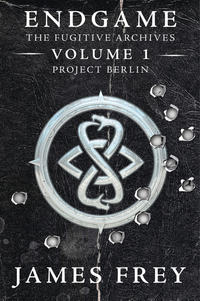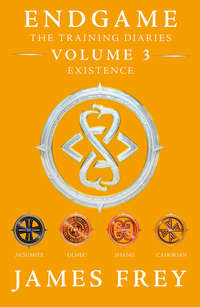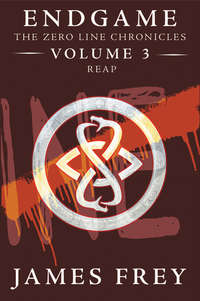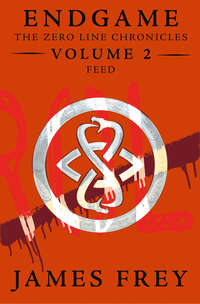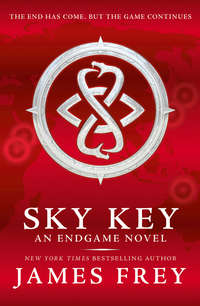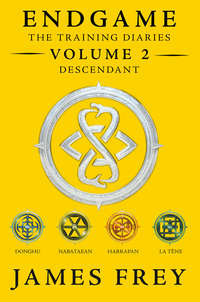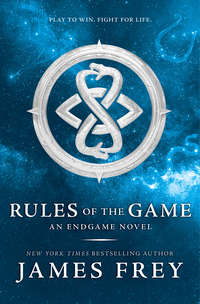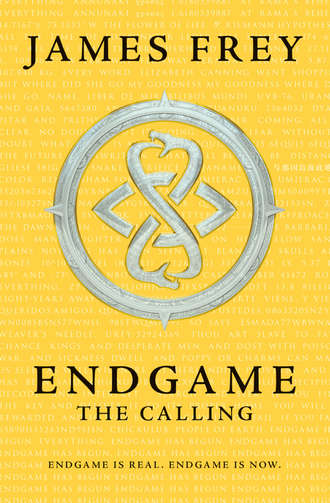
Полная версия
The Calling
Baitsakhan blows a pink bubble. It bursts across his face and he gobbles it back into his mouth. “That’s exactly what we’re saying.” Terbish draws a skinning knife from his belt and takes a step backward. “I’m sorry, kid, but I don’t think so. We found it first.”
“Some yak herders found it first.”
“I don’t see any yak herders around here,” Pry Bar says.
“We told them to leave. And they know to listen. The rock belongs to us.”
“He’s being modest,” Jalair adds. “It actually belongs to him.”
“You?” Terbish asks doubtfully.
“Yes.”
“Ha!” Pry Bar says, holding the rod like a quarterstaff. “I’ve never heard anything so ridicu—”
Jalair cuts Pry Bar short by grabbing the rod, twisting it free, and slamming the pointed end into Pry Bar’s sternum, knocking the wind out of him. Rifleman shoulders the .30-06, but before he can fire, an arrow strikes him cleanly through the neck.
They’d forgotten about Bat behind his horse.
Altan, the man in the hat, gets his hands around the bundle, but Bold throws a black metal dart at him, about eight inches long and a half inch in diameter. It strikes Altan through the hat’s earflap and drives a few inches into his head. He collapses and begins to foam at the mouth. His arms and legs dance. His eyes roll.
Terbish is full of terror and disbelief. He turns and sprints for the truck.
Baitsakhan blows a short whistle through his teeth. His horse trots next to him; he jumps on, kicks it in its side. It catches Terbish in seconds. Baitsakhan pulls hard, and the horse rears and comes down on Terbish’s shoulders and neck. The man is crushed into the earth as the horse turns a tight circle first one way then the next, prancing over Terbish’s body, crushing his bones, taking his fading life.
When Baitsakhan returns to the crater, Pry Bar is sitting on the ground, his legs in front of him, his nose bloody, his hands tied behind him. The rod is under his elbows, and Jalair is pulling up on it.
Baitsakhan jumps from his horse.
The man spits. “What did we ever do to—”
Baitsakhan puts his fingers to his lips. “Shh.” He holds out his other hand, and Bat appears as if from nowhere and places a long and gleaming blade in it. “Don’t talk.”
“What are you doing?” the man pleads.
“Playing,” Baitsakhan says.
“What? Why?” Pry Bar asks.
Baitsakhan puts the knife against the man’s neck and slowly slices the man’s throat open.
“This is Endgame,” Baitsakhan says. “There is no why.”

SARAH ALOPAY
Alopay Residence, 55 Jefferson Street, Omaha, Nebraska, United States

Sarah doesn’t want her brother to be dead or her best friend to be armless in the ICU or her school to be gone. She doesn’t want most of her classmates to have been obliterated. She doesn’t want any part of it. She doesn’t want to be the Player.
Too bad for her.
She sits at the linoleum-topped table, her fingers laced. Simon and Olowa stand behind her. Christopher returned to the crash site to help pull survivors out of the wreckage and do whatever else he can. He’s kind that way. Kind and brave and strong.
Christopher does not know what Sarah is or what she’s going to have to do. He does not know that the meteor fell from the sky in order to deliver her a message. In a way, all those deaths were caused by Sarah’s presence. And there will be more death if Sarah doesn’t Play. Everyone within hundreds, thousands of miles will die if she doesn’t win.
The Alopays are still in shock. They look like actors from a war movie. Sarah hasn’t spoken. Simon has been crying quietly. Olowa has been steeling herself against what has passed and what is yet to come.
The multicolored meteorite rests on an ancient ceramic platter on the table. Olowa has told them that it’s called pallasite—a kind of nickel-iron rock laced with a colorful substance called olivine. In spite of its small size, it weighs 9.91 kg. Cut into the pallasite is a perfect triangular hole.
The stone that flew from Sarah’s neck and saved them rests on the table. It is jet-black, darker than the insides of Sarah’s eyes.
Next to the stone is a rough-edged sheet of yellow paper, and a glass beaker of clear liquid.
Sarah picks up the stone. They have talked about this moment for years. Though Sarah never believed it would come, and doesn’t think her parents did either, now it’s here. They have to follow each step, in proper order. When they were young, before they were eligible, she and Tate would playact and pretend they were doing it. They were children. Like fools, they thought Endgame would be cool.
It isn’t.
Sarah turns the stone in her hand. It is a tetrahedron. Its four triangular sides are exactly the same dimensions as the hole in the chunk of meteorite. The small pyramidal rock is familiar yet foreign. There is no record of its exact age, but the Alopays know that it is at least 30,000 years old. It comes from an era in human history when humans were not believed to have possessed the tools capable of crafting a thing so fine. It comes from a time when humans were not believed to have even been aware of the perfect proportions of golden triangles. But here it is. Passed down again and again and again. An artifact of history before history. A history that is not thought to have existed.
“Here goes,” Sarah says.
This is it.
The future is unwritten.
What will be will be.
She holds the stone over the meteorite; it jumps from her hand and snaps into place, melding with the pallasite. The hairline gap between the objects disappears. For a moment nothing happens. A rock is a rock is a rock is a rock. But as they watch, the stone she wore around her neck turns to dust, as do 3.126 inches of the meteorite around it. The dust mixes, mingles, dances, settles after 11 seconds.
She learned the process when she was five years old. Each step must be done in the proper order.
She pours the dust onto the parchment.
“Ahama muhu lopeke tepe,” her father chants through silent tears. He would rather be grieving for his lost son, but knows there is no time for that.
She spreads the dust.
“Ahama muhu gobekli mu,” her mother chants more resolutely.
She pours the liquid on it.
“Ahaman jeje. Ahaman kerma,” her parents chant together.
The dust steams; the air fills with an acrid smell; the edges of the paper curl, turning the flat sheet into a bowl.
“Ahaman jeje. Ahaman kerma,” her parents chant together.
She picks it up, mixes it.
The liquid evaporates and the dust turns red.
And it appears.
The message.
The Calling.

Sarah stares at the markings. Even though she was not supposed to be the Player, she has always had an affinity for codes and languages. She has been studying them in all their forms since she was four years old. They start shifting into place.
She sees the numbers that are telling her where and how she will start to win.
Sarah thinks about her brother, how Tate couldn’t accept that he had been disqualified from Endgame for losing an eye. How he’d been drifting through his years of ineligibility, how he’d grieved at his inability to continue and the passing of the responsibility to Sarah. How excited he’d looked that afternoon when he’d recovered the meteorite for her. How she can’t actually believe that she’s going to be the one Playing Endgame, and not him. How she is going to have to
Play alone, without Tate’s support.
She thinks about Reena and her missing arm, the confusion on her face. She thinks about Christopher pulling bodies from under rubble. She thinks about her speech. I choose to be the person that I want to be. Those words seem so hollow now that Sarah has no choice.
She will make sure that her family and friends did not die in vain.

All 12 Players of all 12 lines receive the message.
All 12 Players of all 12 lines will attend the Calling.
The 12 Players of the 12 lines are:












MACCABEE ADLAI
Aeroflot Flight 3501, Seat 4B Depart: Warsaw Arrive: Moscow

Maccabee Adlai, the Player of the 8th line, settles into the 1st-class cabin on Aeroflot 3501 from Warsaw to Moscow, which will take 93 minutes. In Moscow he will make a connection for a flight to Beijing, which lasts 433 minutes. He is 16 years old but has the build of a decathlete 10 years his senior. He is six feet five inches tall, and he weighs 240 pounds. He has the facial stubble as well, one of those kids who never really looked like a kid. Even when he was seven, he was much taller and stronger than his peers.
He likes being taller and stronger than his peers.
It gives him advantages.
He removes the jacket of a three-button custom silk suit. He settles into his aisle seat. His French-cuffed shirt is powder blue and white gingham. His rose-patterned tie is held in place with a silver clip. His cuff links are made of fossilized mammoth ivory. They are shaped like Tibetan skull beads and have ruby chips for eyes. On his left pinkie is a large brass ring inset with a drab tan stone carved in the shape of a flower.
Maccabee smells like lavender and honey. His black hair is wavy and full and slicked back. His forehead is broad and his skull is apparent, as if his skin is almost too thin. His temples are a little sunken and his cheekbones high. His eyes are blue. His nose is narrow but large with a hook in the bridge.
It has been broken five times.
He likes fighting. So what? When you’re Maccabee’s size, fights have a tendency to find you. People want to see how they measure up. In Maccabee’s case, they always come up short.
His only bag—a leather monogrammed shoulder satchel—is in the overhead compartment. He expects other Players to be burdened with packs and suitcases and all kinds of expectations. Maccabee doesn’t like to be burdened. He prefers to be nimble, fast, to be able to move and strike at will. Plus, the world has not ended yet. Until it does, money will suffice.
Lots of money.
He fastens his seat belt and turns on a smartphone and listens to a recorded message. He has listened to the message dozens of times:
NASA/ESA/ROSCOSMOS Joint Press Release, 15 June:
At 22:03 GMT on 11 June a large and previously undetected Near Earth Asteroid (NEA), since designated CK46B, passed within 500,000 miles of Earth. Accompanying this parent NEA were several hundred children of varying magnitudes. At least 100 of these objects are confirmed to have been drawn into Earth’s gravitational field. Like most “shooting stars,” the majority of these burned up in the atmosphere, leaving nothing but visual evidence of their descent and demise. However, as worldwide press coverage has well documented, at least 12 bolides did survive the rigors of atmospheric entry.
While the sudden appearance of an NEA as large as CK46B is disturbing, it is the purpose of this release to assuage fears of a larger impact in the future. Impacts like these—especially like those that occurred in Warsaw, Poland; Jodhpur, India; Addis Ababa, Ethiopia; and Forest Hills, Queens, New York, USA—are exceedingly rare. Through joint efforts of our agencies, plus those of the ISA, JAXA, UKSA, and AEB, you can be assured that other NEAs and Near Earth Objects (NEOs) are identified and tracked on a regular basis and that at this time it is our consensus opinion that our planet is in no danger whatsoever of being struck by anything larger than the meteorites mentioned above.
Finally, it is also our opinion that the shower propagated by CK46B is complete and that no additional meteors can be expected. CK46B has been charted and it is not due to reappear in our vicinity for another 403.56 years. For now, the possible danger posed by this NEA is considered past. Any further information—
“Excuse me,” a man says in Polish as he knocks into Maccabee, yanking the cord of his headphones from his ears.
“I should say so,” Maccabee says in perfect English with equal parts confidence and annoyance.
“You speak the English?” the man asks, also in English, dropping heavily into his window seat. He is 40 or so, sweating, overweight.
“Yes,” Maccabee says. He glances across the aisle. A very pretty woman in a form-fitting dark suit rolls her green bespectacled eyes. Maccabee returns the gesture.
“Then I will speak the English too,” the man announces. “I will practice. Yes? Onto you?”
“Practice with me,” Maccabee corrects, winding the cord of his headphones around his hand.
“Yes. With you.” The man manages to shove his valise under the seat in front of him. He struggles to find his seat belt, pulling hard at the buckled end, which does not move.
“You have to let out the buckle. Like this.” Maccabee unfastens his seat belt and shows the man how it works.
“Ah, how silly of me,” the man says in Polish.
“They should do away with them, in my opinion,” Maccabee says, still speaking English and clicking his back together. “If the plane crashes, this is not going to help anyone.”
“I agree,” the pretty woman says in English, her eyes remaining on the magazine she’s browsing.
The man leans past Maccabee, eyes the woman. “Aha. There hello.” He’s back to English.
Maccabee leans forward to intercept the man’s prying eyes. “It’s ‘Hello, there.’ And she wasn’t talking to you.”
The man recoils. “Gentle, young one. She is the pretty woman. She knows it. I just let her know I know it too. What is wrong by that?”
“It’s rude.”
The man waves his hand dismissively. “Ah! Rude! A good English word!
I like. It is meaning ‘not nice,’ no? What is it … ‘unpolite’?”
“Impolite,” the woman answers. “It’s okay. I’ve had worse.”
“There. See? You have the nice suit, but me, I have the … the … experience.” This last word is in Polish.
“Experience,” Maccabee translates.
The man jabs a finger into Maccabee’s shoulder. “Yes, experience.” Maccabee looks at the man’s finger, still pushed into his shoulder. Maccabee is being underestimated, which is the way he likes it. “Don’t do that,” Maccabee says calmly.
The man jabs him again. “What, this?”
As Maccabee prepares to respond, a flight attendant appears and asks in Polish, “Is there anything wrong?”
“Ah, another one,” the man says, his eyes just as greedy for the attendant. She is also pretty. “Yes, there is something wrong, as a matter of fact.” The man animatedly drops his tray table in front of him and taps it. “I haven’t got my drink yet.”
The attendant joins her hands in front of her. “What would you like, Mr. Duda?”
The woman across the aisle chuckles at the appropriateness of his name—which usually means “booby”—but Duda doesn’t hear. “Two champagnes and two Stolichnayas. All in sealed bottles. Two glasses. No ice.”
The attendant doesn’t even bristle. She works for Aeroflot and has seen her share of drunks. She nods at Maccabee. “And for you, Mr. Adlai?”
“Orange juice, please. In a glass with ice.”
“Adlai, hm? You a Jew?” Duda asks in Polish.
“In a manner of speaking, yes,” Maccabee says, turning in his seat.
“Figures. Explains all the finery.” Duda’s eyes dart up and down Maccabee’s shirt. “Also explains the scent you exude.” Duda is staying with Polish, probably for the same reason Maccabee chooses English. The attendant returns and bends over, holding a tray, and gravity and pressure part the divide of her collared shirt.
Maccabee takes his orange juice as Duda winks, grabs his drinks, and whispers, “Bend over a little more next time and I’ll give you a nice tip.”
The attendant smiles and straightens. “We don’t accept tips, Mr. Duda.”
“Pity,” Duda says, as he cracks the two Stolichnayas and pours one into each glass.
She turns and walks away.
Duda leans forward and reaches over Maccabee. “How about you?” he asks the woman across from them. “Would you accept a tip from me in exchange of services?”
“That’s enough,” Maccabee says, as his heart starts to beat faster, moving from a resting rate of 41 to a heightened rate of 77. “If you speak again, you’ll regret it.”
Duda downs one of the vodkas and says quietly so only they can hear, “Oh, little boy. I see you dressed like a man, but you don’t fool me.” Maccabee takes a deep breath and slows his heart rate, as he has been trained to do. Killing, if it becomes necessary, is best done in a calm manner, and with smooth, easy movements. He did it for the first time at age 10, and has done it 44 more times in the years since.
The man leans into his seat, drinks the other vodka and both champagnes. He rolls toward the window and closes his eyes.
The plane taxis, takes off, reaches cruising altitude. The pretty woman minds her business. And for a while Maccabee does too.
After about an hour, though, he leans across the aisle and says in English, “I’m sorry about all that, Miss …”
She smiles. “Miss Pawlek.” He can tell that she thinks he is at least 22 or 23. Most people do, especially young women.
“Miss Pawlek.”
“Why should you be sorry? You behaved perfectly.”
“I wanted to punch him.”
“We’re on a plane. You can’t.”
They start to talk. Maccabee quickly realizes that she is tired of talking about the meteorite that has scarred Warsaw, or the 11 others that have rattled the world. It’s all anyone has been able to talk or think about for a week, so he lets it lie.
Instead, Maccabee practices a subtle form of interrogation on her. He has been trained to use techniques that reveal sensitive information from people without their knowing. She is from Goleniów, a medieval capital near the German border. She works for an internet investing firm. She is meeting a client in Moscow. Her mother is dead. Her brother is an accountant in Krakow. She likes Italian opera and watches the Tour de France every year on TV. She has been to L’Alpe d’Huez. She has been in love once, when she was 19, and hopes, she says with a smile, to fall in love again.
Maccabee doesn’t say anything truthful about himself, except that he is on a business trip that will take him all the way to Beijing. Miss Pawlek has never been there. One day she would like to go.
They order a round of drinks, Maccabee opting for a ginger ale. As they toast, they don’t realize that Duda is awake and watching them. “Moving in on my action, eh?” he announces without lifting his head from his pillow. Duda points at Miss Pawlek, amused. “You should leave this boy alone. Women like you need a real man.”
“You’re a pig,” she replies with a sneer.
“That’s not what you’re going to be saying later,” Duda says, smiling. The plane jerks. It is flying at 31,565 feet. The wind is coming from the north-northwest at 221 mph. The fasten seat belt light comes on. It’s rough enough that 167 of the 176 passengers grip their armrests, 140 of them look at the person next to them for reassurance. Eighteen start praying silently. The meteorite has put the idea of horrific, sudden death at the front of everyone’s mind.
Maccabee doesn’t mind the turbulence. To quote one of his favorite books: Fear is the mind-killer. He has practiced besting fear over and over and over again. He has practiced being cold and calculated and efficient. And while Duda is essentially harmless, it never hurts to continue to practice.
He leans close to Duda, pushing a small button on the palm side of his pinkie ring, revealing a short silver needle in the center of the stone flower.
“If you speak to me again, or to anyone on this flight—”
The plane jumps again. The wind speed has increased to 231 mph. More passengers whimper in fear; more begin to pray.
“Don’t threaten me, you little—” Duda says, but Maccabee, with his heart rate back at 41, and quickly enough so that no one sees, strikes the exposed flesh of Duda’s neck with the needle.
“What did you …” Duda says.
“You should have listened,” Maccabee says quietly, coldly, with a smile. Duda knows what’s happened but is unsure if it’s sleep or death that’s coming for him.
Duda cannot speak to ask.
Duda can no longer move.
Duda’s eyes fill with confusion and terror.
The plane slides hard from side to side. The wind is gusting faster. People are not quiet about their praying now. They are calling out to God. Maccabee lets his heart rate rise.
A baby in coach class starts crying.
As Duda’s eyes roll into his head, Maccabee props a pillow against the window and pushes Duda into it. He runs his fingers over Duda’s eyelids. He puts the man’s hands in his lap, one over the other. Maccabee settles back into his seat. He has met so many strange people in his life. He wonders who he will meet when he arrives in China.
Six minutes later the turbulence ends. Miss Pawlek looks over at him, smiles. Her brow glistens with a nervous sweat; her cheeks are flushed. Maccabee likes the way she looks in that moment: the relief mixed with something else.


